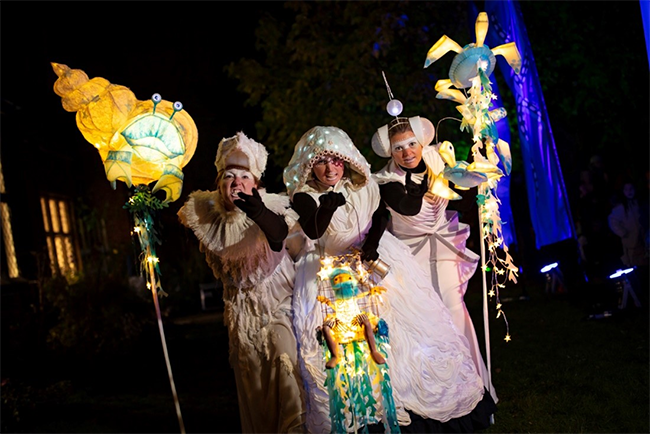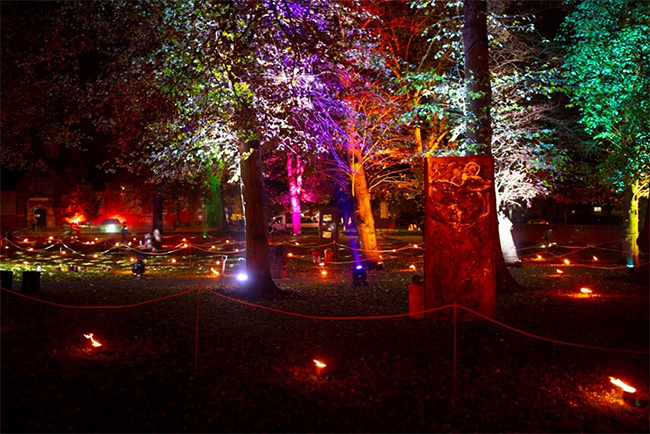Gainsborough’s Mayflower 400 cultural programme was a wide ranging arts-led approach to engage the public with a shared heritage connecting them to people and places across the world.
Introduction
2020 was the 400th anniversary of the Mayflower’s voyage from England to America, and many of the ship’s Pilgrims came from the local area. Commemorative events and activities began in earnest in November 2019, and were due to run throughout the year ending with a final signature event the following November. The programme was dramatically revised as a consequence of the pandemic, finally ending in November 2021 with a spectacular ‘Illuminate’ event.
The challenge
The onset of the pandemic disrupted all the events scheduled for the summer and autumn of 2020, which had been promoted within the official Mayflower 400 national programme. West Lindsey District Council’s events and partnership projects were supported by funding from Arts Council England, the National Lottery Heritage Fund and local partners. As part of a national portfolio, it had been widely advertised across local, regional and national media and promoted to the travel trade.
The programme sought to engage diverse and harder to reach audiences, including local residents and visitors, with a significant international story across four nations (UK, Netherlands, USA and Wampanoag nation) connected to local places. It aimed to create meaningful and memorable engagement with a complex heritage, bring communities together, increase local knowledge to improve identity and sense of place, offer high-quality, new, innovative artistic activity and opportunities, and create ambition for future significant cultural events and activities in an area with low arts and culture engagement and expectations.
Events could not take place as planned, particularly during periods of lockdown, and anticipated large participant and audience numbers could not be achieved in the original timeframe. Volunteer and community-led events were postponed, to be scaled down or reimagined, or cancelled, and the envisaged ‘PilgrimAGE’ summer season of events could no longer be delivered. A new history exhibition was installed in early March 2020, due to open to the public the following week but never did, as we entered the first period of lockdown. The final spectacle, an ‘Illuminate’ event featuring a parade of lanterns created in a series of pre-event workshops with children and young people, a fire garden with performers, a film projected onto Gainsborough’s historic Old Hall, and the inaugural performance of a specially commissioned choral work could not take place in November 2020.
The solution
2020’s original Gainsborough Mayflower 400 programme was radically revised and reimagined to ensure ongoing engagement with the story and its local resonance could be maintained over a longer period, until post-pandemic, when events could be held. Funders were supportive of postponing face-to-face activity and revising delivery plans to make sure events were safe whilst maintaining quality and engagement opportunities. By extending the delivery period into 2021, we were able to increase the number of activities, reach more people including those who may not have otherwise been involved, diversify our engagement to include more online and digital activity, and still deliver our signature events to bring people together in a spectacular way once it was safe to do so.
Summer’s PilgrimAGE events became an online season of shared Mayflower-themed media and reflective content – informed too by the global response to the Black Lives Matter movement which resonated with the Wampanoag story and the colonial and post-colonial consequences of the Pilgrims’ arrival in America. A weekly history blog, animated stories, podcasts and online exhibition content were shared regularly and widely, culminating in the 16 September voyage anniversary and an online documentary hosted by Dan Snow, made possible through Gainsborough’s role in the Mayflower 400 partnership.
The planned ‘Illuminate’ parade in November 2020 was transformed into an online and stay-at-home event, where people across the region shared photos of candles in their windows on social media using the hashtag #OneSmallCandle. Artist-designed toolkits to create homemade jar lanterns were created and shared online and with local schools, and templates were distributed to households across the district. The final in person ‘Illuminate’ was moved to November 2021, where the procession was replaced with a self-led arts trail, and people were able to enjoy the immensely popular fire garden, new choral work and feature projection.
The impact
2020’s Mayflower commemorative year stretched into 2021, with a revised focus on the 400th anniversary of the Pilgrim’s first Thanksgiving in America; the idea of our communities coming together in the present and giving thanks themselves became a poignant symbol in the immediate post-lockdown period.
Increased emphasis on sustaining interest in the anniversary and its associated heritage over a longer period meant relationships with collaborative partners were developed to a greater depth, and opportunities for engagement with the programme increased given more time and new focus on what could be achieved online – with digital media and online talks, including teacher training opportunities. Teachers who took part in earlier heritage training sessions were eager to be involved in activities that gave their students artistic opportunities focused on a story local to them and full of contemporarily resonant themes, including tolerance/intolerance, migration, belonging, freedom and oppression.
Once live events could take place in 2021, audiences were excited to see, hear, and take part in performances, music, trails and exhibitions. A new Pilgrim Woman sculpture was installed on Gainsborough’s riverside, foregrounding the significant but often overlooked roles of women in the Pilgrims’ story and connecting the town to others in the region through the extensive network of volunteers who had contributed to the sculpture’s design. Local people welcomed her arrival, which left a physical legacy of the commemorations alongside the memories created for thousands of people who had engaged with the programme’s other activities or events.
Our evaluation demonstrated we achieved our aims of public engagement using an arts-led approach to inspire people and create ambitions for the future cultural life of the local area. People want to see more similar events and have chances to take part, and welcome high-quality artistic outputs made possible through National Lottery, local authority and partner funding.
How is the new approach being sustained?
Gainsborough’s Mayflower 400 commemorations officially ended with the final Illuminate event in November 2021 but the programme’s legacy continues. Aspirations for further, sustained cultural activity were an important outcome, with many people wanting to take part in similar activity in the future.
West Lindsey District Council are developing a cultural strategy, responding to an acknowledged need to embed cultural activity in the district and take a strategic approach to its planning and delivery, in the context of similar initiatives in the county. Recommendations from the outcomes and evaluation of the Mayflower programme will contribute to this process, and inform decision makers about the next steps that can be made in the district to embed quality, meaningful cultural activity that contributes to local pride and identity and improves wellbeing and economic outcomes for more people.
While the cultural strategy is being developed, an interim ‘Illuminate’ event is planned this coming November, which turns attention towards local people and their hopes and dreams for the area, alongside reflections on its past history. The themed ‘We Are West Lindsey’ event will feature local voices and contributions to a specially commissioned projected film, building on the learning from 2021’s event. Public engagement and workshops will re-engage organisations and schools involved in the Mayflower programme, informing them about the cultural strategy process and providing a forum for them to contribute to that too. This year’s final event and workshop activities will provide creative consultation to ensure a wide variety of people can take part in informing the district’s future cultural direction.
Additional Arts Council England (ACE) funding is being sought to deliver a high-quality event, ensuring expectations are met. Approaches to diversifying engagement using toolkits online and distributed to schools developed during the pandemic will contribute to this project as well, aiming to include existing and new participants.
Lessons learned
Gainsborough’s Mayflower programme took an arts-led approach to engagement with heritage in the context of a particular place and its relationship with the wider region and beyond – connected by journeys made in the past and newly formed relationships in the present.
Strong and resilient networks and partnerships were key to delivering a successful programme despite challenges that arose as a consequence of the pandemic. A degree of flexibility was needed to maintain dialogue during a challenging period, as people adapted to working remotely and needing to deliver events in different ways.
It was important to maintain dialogue with funders and their support in return allowed original plans to be adapted so that some elements could be delivered differently rather than not at all. Updating project partners regularly was an important part of keeping the programme on track, as was learning from others and recognizing potential challenges and risks that could affect delivery, then taking time to consider how to respond to rapidly changing circumstances.
Working with professional artists and creatives was key to delivering an adapted programme, during a period when there was increased pressure on volunteers, particularly where many of these tend to come from older or more vulnerable groups or were involved in other essential roles during the pandemic. Many voluntary groups were not sustainable during periods of isolation, so being able to offer creative activities supported by professionals helped bring people back together.
The programme created a range of outputs aimed at different audiences, ages, abilities and interest levels (through books, music, film, crafts, dance, audio, digital, talks, trails, animation, and performance). An eclectic range of outputs and creative ways of sharing these, online and in person, helped reach wider and diverse audiences and had a significant impact on the perception of the place and its potential.
Contact
Dr Anna Scott, email: [email protected]


